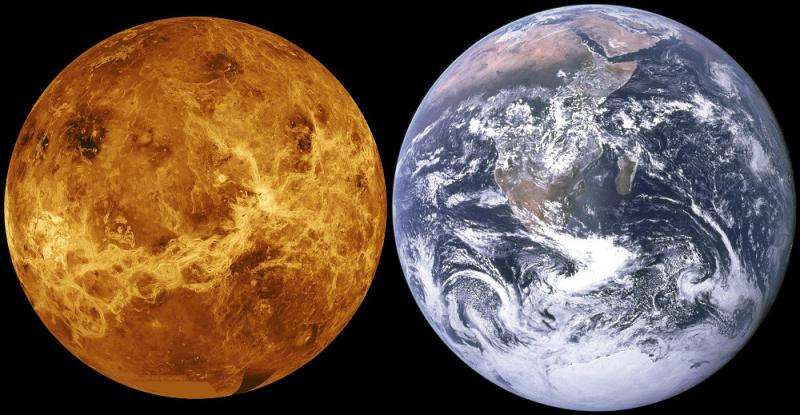
Posted on 01/26/2024 7:31:13 PM PST by Red Badger

Size comparison of Venus and Earth. Credit: NASA/JPL/Magellan Venus is only slightly smaller than the Earth, and so has enjoyed billions of years of a warm heart. But for this planet, sometimes called Earth's sister, that heat has betrayed it. That planet is now wrapped in suffocating layers of a poisonous atmosphere made of carbon dioxide and sulfuric acid. The pressures on the surface reach almost 100 times the air pressure at Earth's sea level. The average temperatures are more than 700°F, more than hot enough to melt lead, while the deepest valleys see records of more than 900°.
If Venus is indeed Earth's sister, she's a twisted one. Like Mars, we suspect that Venus also once hosted a thinner, balmier atmosphere and a surface replete with liquid water oceans. The reasoning here is a little more tenuous than for Mars—where we can literally see the evidence for water before our very eyes—but the thinking is that both Venus and Earth formed in a roughly similar fashion, in roughly the same orbits with roughly the same material. Thus we should have been born with roughly the same amount of water.
Like Earth, most of that water would have been chemically bound up in rock, buried deep in the mantle. But some of it may have leeched to the surface or been delivered by hosts of water-rich comets shortly after formation, building up a supply on the surface, once again stabilized by a thick atmosphere.
What doomed Venus was not any fault of its own, but our own treacherous sun. As stars age they gradually brighten. Day by day it's imperceptible, but over the course of millions of years it completely changes the character of a star. Billions of years ago our sun's habitable zone was shifted inwards compared to where it rests now, but with increased brightness comes increased heat, and that habitable zone steadily creeps outwards over time.
Did Venus ever host life? I doubt we'll ever know, given the excruciating temperatures on the surface that make exploration nearly impossible. But it's likely that it had water and a rich atmosphere—the basic ingredients were there. But if life did gain a foothold it did not last long. As our sun aged, Venus got warmer and warmer. On a warmer planet, more water exists as vapor in the atmosphere than as liquid on the surface.
At first the changes were small, with nothing more than a higher dew point to mark the inexorable path to destruction. But at some point in the past—we are not sure exactly when—Venus reached a tipping point. With too much water vapor, the atmosphere of Venus became too good at trapping the heat radiating from the surface. That radiation could not penetrate the haze and make into space, but instead was ensnared within the atmosphere itself, heating it up.
VIDEO AT LINK...............
What came next was, at least, mercifully quick. Venus entered a feedback loop, dumping more heat into the atmosphere, which boiled the oceans into more vapor, which increased the temperatures, and so on. First the shallow lakes and streams were gone, then came the deeper oceans, until every scrap of water was blowing in the winds of the atmosphere.
With its proximity to the ever-brightening sun, the water vapor did not last long. Solar radiation pummeled it, disassociating its chemical bonds and sending the oxygen and hydrogen flying away, joining a grim procession beyond our solar system.
If Venus had plate tectonics like the Earth, then this is where that process came to end. With no water to act a lubricant, the great slow grinding of the plates seized up, locking the crust in place. This constant churning acts as a natural sink for carbon: the carbon dioxide binds to rocks which get pulled deep into the mantle, preventing too much carbon from building up in the atmosphere.
But without the cleansing effect of plate tectonics, carbon dioxide levels rose to dangerous heights, its own ability to absorb radiation from the surface choking off any remaining hope for rescuing the planet. Eventually the atmosphere would pile upon itself until it reached its present swollen size.
As our sun aged, Venus strangled itself.
Venus is not alone in sharing that fate, for the sun has not yet reached its final days. It continues to brighten, bringing more warmth to the solar system day by day, its habitable zone steadily inching outwards with every passing year.
At some point, approximately 500 million years from now, Venus will not be alone, The Earth's oceans will boil, our continents will halt their ancient motion, and we will finally be twins with our sister: dead, lifeless, and strangling on our own bloated atmosphere.
Provided by Universe Today
Correct, see my post 34 above.
There is a guy named Venus on WKRP.
https://en.m.wikipedia.org/wiki/Venus_Flytrap_(WKRP_in_Cincinnati)
Here on earth, as stars age, they gradually turn into cat people.
What was her name?
900 degrees! Our oceans would be boiling hot!
Neither Mars nor Venus has an intrinsic magnetic field to block the solar wind. The solar wind eventually strips away the atmosphere and things go south from there.
Venus Williams is now older and needs lubricant?
Lol!
Our beautiful Earth really is something special. Wouldn’t surprise me if it’s totally unique in the universe.
Venus was probably never “alive”, so it couldn’t “die”.
For an interesting take on it, read “Worlds in Collision”, 1950, by Immanuel Velikovsky.
Weather report on Venus: A slight chance of sulfuric acid rain today
If only they had taxed themselves more and gotten rid of SUV’s and gas vehicles sooner....
Disclaimer: Opinions posted on Free Republic are those of the individual posters and do not necessarily represent the opinion of Free Republic or its management. All materials posted herein are protected by copyright law and the exemption for fair use of copyrighted works.